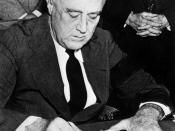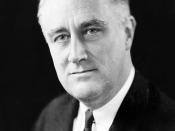The years of the Great Depression were a time of great change in American
society. New reforms were an attempt by President Franklin Roosevelt to relieve
unemployment, poverty and alter the economy to bring the Great Depression to an end.
However, it was not until the 1940's after America's involvement in World War II
that the effects of the depression ended. While these new policies did help to prevent the
economic crisis from becoming any worse, it was America's entry into World War II that
restored the country's economy.
The reform movements did not end the Great Depression in the late 1930s.
Through policies such as the TVA project, and the Works Progress Administration, the
downward economic trend was slowed down but did not bring about lasting economic
reforms (Document H). By 1940, several years after reforms were implemented, "fifteen
percent of the nation's working force still did not have a job."
(Document A) While the
government started the WPA to employ jobless Americans, assistance, especially to
women, was limited to domestic jobs. Roosevelt's plan offered what
appeared to be promising advances, but was often proven ineffective (Document D). The
policies did not provide permanent solutions to unemployment problems. Also, certain
aspects of the New Deal were deemed unconstitutional by the Supreme Court ruling of
Schechter v. United States. (Document E) For this reason, the New Deal and many
reforms during the great depression had few lasting impacts on American society.
U.S. entry into the war provided a solution for many problems that had challenged
supporters of the reform movements. "The events leading to the outbreak of war and
subsequent American entry into it are of an importance and interest so great it is difficult
to exaggerate." (Document C) The war, not reforms, brought about full employment
through industrial...


